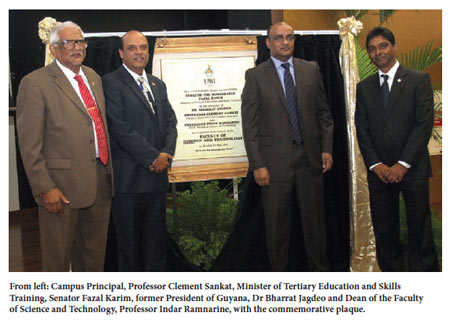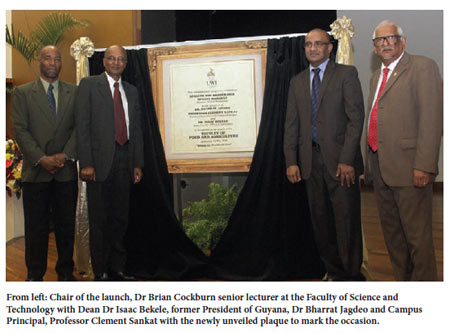 |
 |
 |
|
May 2014
|
It doesn’t matter how amicable a parting is, nobody wants their ex to see them looking frowsy or down-at-heel. So although a good two years have passed since the new deans of the Faculty of Science and Technology and the Faculty of Food and Agriculture officially took up their duties in August 2012, there was a slight bristle in the air as the faculties were officially launched on May 12, 2014. \ The Deans each charmingly engaged the audience at Daaga Auditorium as they outlined the accomplishments and plans of their respective faculties. In the end, it would have been difficult for anyone not to admit that both faculties have made tremendous strides since they parted ways. Yet, they were urged to do more to raise their profiles—particularly in the agricultural sector—by feature speaker, former President of Guyana, Bharrat Jagdeo. Despite the achievements, he said, policy makers were still not moved to put agriculture higher on the list of priorities. “If this sector is so important here at UWI, how is it that in reality it does not exist out there?” he asked.
He criticized leaders for not giving these issues top priority. “There isn’t a sense of urgency and that is what we need today, a sense of urgency among our policy makers,” he said, suggesting there should be term limits right through the Caribbean. For his part, the Campus Principal, Professor Clement Sankat, asserted his belief that agriculture in the Caribbean is at a crossroad, where it faces several challenges. “…we import large quantities of food (which I understand is in excess of US$4 billion annually for the Caribbean); there is a declining interest in the profession of agriculture (particularly among our young people); we have an ageing population of farmers; decreasing production levels; lack of consistent policies geared towards agriculture; low level of support for research, development, technology transfer and innovation; lack of land and finances for persons who would like to go into farming; and of course, poor rural infrastructure,” he said in his remarks. He noted that the private sector did not seem particularly interested in investing in this area and it meant that sustainable solutions had to be found. “Let us remember that agriculture is of enormous importance to the people of our region as it plays an essential food and nutrition provisioning role. We cannot escape this. Agriculture can also have a great integrative role to build sustainable economies, protect our natural resources and the environment and create new opportunities for the vulnerable in our societies,” he said. The Minister of Tertiary Education and Skills Training, Senator Fazal Karim was full of ideas, even as he urged The UWI to “pursue relentlessly income generation strategies outside of Government subventions.” Noting that his Ministry had established a Higher Education Research Fund, managed by the National Commission for Higher Education (and chaired by Principal Sankat) he said there was already $6.5 million in it, which could be used for research.
And as Isaac Bekele, Dean of the Faculty of Food and Production made his presentation, it seemed that the sky was, indeed, the limit. While he outlined the serious challenges facing agriculture in the region, and the university, he pointed to several new programmes which are targeted to create more relevance for young people wishing to enter the field. He said FFA has identified a reservoir of local staple crops, mainly what we call ground provisions, and they are working on increasing their shelf life. He talked about research in animal life, in soils, in agricultural technology, and the many publications coming out from resident scholars. And he talked about the massive Orange Grove Farm project which will house the University Field Station, among other things on its 200 acres. Six zones, he said have been earmarked for a technology service centre (20 acres), a leisure and recreation area (45 acres right at the heart), a crop area (45 acres), a horticultural area (60 acres) and an aquatic production area to use up the remaining 25 acres. As he flipped through the slides showing the state of the art facilities intended for this Field Station, it was evident that somebody was taking agriculture very seriously. But Professor Indar Ramnarine, Dean of the Faculty of Science and Technology, is himself a very serious man, with a decidedly succinct and scientific way of presenting his data, and when it was his turn, he did exactly that. “During our first year of existence, we concentrated on curriculum reform. All our programmes were critically evaluated and some programmes were discontinued. Existing programmes were revised and benchmarked against international standards,” he said. He listed more than a dozen new programmes and their specializations: BSc’s in Biology (specializing in plant biology, zoology, ecology and environmental biology and biotechnology) Chemistry, Environmental Science and Sustainable Technology, Biomedical Tchnology… a whole long list of these and Master programmes (which you can find on the website) and some new ones being planned, including post graduate programmes in areas such as Biomedical Physics, and industrial, medicinal and analytical chemistry. It was all very impressive and quite heartening to see that despite the break-up of this long-wed couple, once known as the Faculty of Science and Agriculture, they have both moved on and are still able to keep their shine. (Vaneisa Baksh) |


 Jagdeo, who has championed agricultural development and has been very vocal on the issue of climate change, used the opportunity to once again raise them and to stress the significance of food security and agricultural sustainability to regional survival.
Jagdeo, who has championed agricultural development and has been very vocal on the issue of climate change, used the opportunity to once again raise them and to stress the significance of food security and agricultural sustainability to regional survival.  “Can you imagine if we can invest in research to reduce emissions at Point Lisas? What about developing commercially viable ethanol fuel from sugar cane bagasse?” These are the obvious examples, he said. “What if we finance research that leads to agriculture or technology start-ups even while our students are in school? The sky is the limit,” he said.
“Can you imagine if we can invest in research to reduce emissions at Point Lisas? What about developing commercially viable ethanol fuel from sugar cane bagasse?” These are the obvious examples, he said. “What if we finance research that leads to agriculture or technology start-ups even while our students are in school? The sky is the limit,” he said.